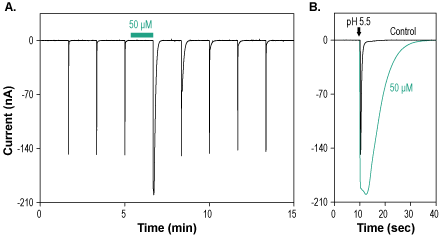Overview
Cono VGRPRF-amide conotoxin is a peptide toxin originally isolated from the venom of the cone snail Conus textile and strongly potentiates ASIC3 by slowing the desensitization kinetics of the channel. Cono VGRPRF-amide belongs to the subgroup of cono-RFamides containing C-terminal sequence of four amino acids and a C-terminal Arg–Phe–NH2 (RFa) motif1.
ASIC channels are proton-gated Na+ channels directly activated by extracellular protons. They are expressed throughout the CNS and the peripheral nervous system. They are responsible for synaptic transmission and detection of painful acidosis. ASICs play an important role in several physiological and pathological conditions including synaptic plasticity and learning, fear conditioning, and neurodegeneration associated with ischemic stroke1,2.
Specifications
Technical Specifications
Biological Activity
- Reimers, C. et al. (2017) Proc. Natl. Acad. Sci. U. S. A. 114, E3507.
Solubility and Storage
Applications
 Alomone Labs Cono VGRPRF-amide positively modulates ASIC3 channels expressed in Xenopus oocytes.A. Representative time course of Cono VGRPRF-amide (#STC-172) potentiation of ASIC3 current. Membrane potential was held at -80 mV, current was elicited every 100 sec by a transient application of pH 5.5, and reversibly potentiated by a 60 sec application of 50 µM Cono VGRPRF-amide, as indicated. B. Superimposed traces of ASIC3 currents before (black) and after (green) application of 50 µM Cono VGRPRF-amide, which significantly extends the current following stimulation (arrow). Taken from the experiment in A.
Alomone Labs Cono VGRPRF-amide positively modulates ASIC3 channels expressed in Xenopus oocytes.A. Representative time course of Cono VGRPRF-amide (#STC-172) potentiation of ASIC3 current. Membrane potential was held at -80 mV, current was elicited every 100 sec by a transient application of pH 5.5, and reversibly potentiated by a 60 sec application of 50 µM Cono VGRPRF-amide, as indicated. B. Superimposed traces of ASIC3 currents before (black) and after (green) application of 50 µM Cono VGRPRF-amide, which significantly extends the current following stimulation (arrow). Taken from the experiment in A. Alomone Labs Cono RF-amide peptides positively modulate ASIC3 channels expressed in Xenopus oocytes.Representative superimposed traces of ASIC3 currents before (black) and following a 60 sec application of 50 µM Cono RPRF-amide (#STC-170), Cono VGRPRF-amide (#STC-172) or Cono AIVGRPRF-amide (#STC-174) (green), which significantly extend the current evoked by a transient application of pH 5.5 (arrow), at membrane potential of -80 mV.
Alomone Labs Cono RF-amide peptides positively modulate ASIC3 channels expressed in Xenopus oocytes.Representative superimposed traces of ASIC3 currents before (black) and following a 60 sec application of 50 µM Cono RPRF-amide (#STC-170), Cono VGRPRF-amide (#STC-172) or Cono AIVGRPRF-amide (#STC-174) (green), which significantly extend the current evoked by a transient application of pH 5.5 (arrow), at membrane potential of -80 mV.

